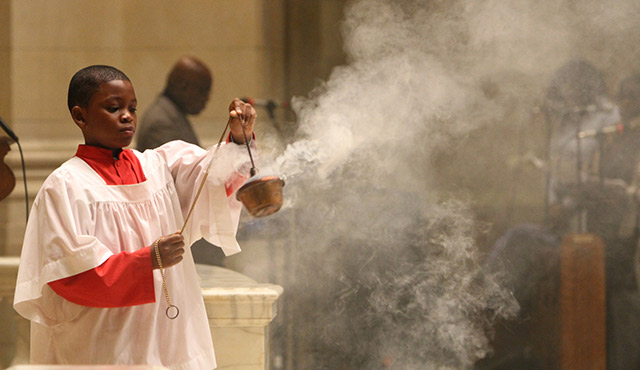Before Vatican II, the role of the laity at Mass was severely limited: ushers took up the collection and boys acted as altar servers.
Today, the sanctuary fairly bristles with lay ministers, and opportunities for the faithful who want to take an active role in the celebration of the liturgy are numerous, and there are jobs for almost all age groups.
Younger parishioners, for example, can continue the long tradition of altar service, directly assisting the priest during the course of Mass and other liturgical functions. Altar servers lead processions, carry candles or the cross, hold ritual books and help prepare the altar for the service, among other functions.
“Those who wish to become [an altar server] go through a series of training sessions,” says Deacon Tom McGuine, who serves at Holy Family Cathedral in Orange. “They learn where the various items that are used for Mass are stored. Then they go through practice runs.”
Ushers make sure that parishioners and visitors are gladly received at any liturgical service. They help prepare the church for Mass, greet people as they enter, provide directions, distribute bulletins and service programs and collect financial offerings, among other duties.
“They serve a very important function: ensuring that people are welcomed when they come to Mass,” says Monsignor Arthur Holquin, Episcopal Vicar for Divine Worship for the Diocese of Orange and pastor emeritus of Mission Basilica San Juan Capistrano.
Priests generally will make it known when ushers are needed, and volunteers typically step forward. As is the case with altar servers, training involves a few sessions in which ushers-to-be learn about the basics of a given service.
The lector, another lay liturgical role, proclaims the Scripture readings used in services. The position involves “proclaiming publicly God’s Word in an effective manner,” says Monsignor Holquin. “It’s more than just reading text.”
Training, he notes, varies from person to person. Usually about four to six educational sessions, it includes proper vocalization, how to use a microphone, proper interpretation of the readings, mastering difficult words and the various resources available to them, among other elements.
Extraordinary ministers of Holy Communion assist in the distribution of the Eucharist during Mass.
“For many centuries, it was felt that only ordained ministers could touch the sacred body and blood of the Lord in the form of bread and wine,” says Monsignor Holquin. “But with so many people going to Communion, and not enough ordained ministers available to distribute [this], the Church has permitted laymen and laywomen to assist in this ministry.
“Pastors are more selective about this ministry. They’ll ask individuals who are active in the parish to consider doing this.”
Trainees, he says, learn about history, spirituality and specific practical details about the distribution of Communion. As is the case with altar servers, ushers and lectors, training varies from parish to parish and from person to person.
Music ministry has always been a part of the liturgy and “is not an optional element; it’s an integral aspect of the liturgical life of the Church,” Monsignor Holquin says.
For this reason, each church utilizes the lay services of musical directors, as well as cantors, organists and other musicians. Musical directors, who are professionally trained, oversee the musical element of Mass and they orchestrate all aspects of musical liturgy: planning, training and scheduling.
The cantor leads the assembly in singing prayer. Although they aren’t considered soloists, they occasionally sing solo passages.
Those who are interested in taking a more active role in the liturgy – and strengthening their faith in the process – can contact their parish’s leaders. There’s something for everyone.

